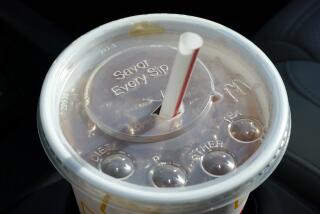Coke to Curb Marketing in Schools
- Share via
Coca-Cola Co. is set to announce today changes in the way it markets products in public schools--an attempt to address complaints from parents and others about fatty, sugary snacks and excessive commercialism on campus.
Among other shifts, the company said it will urge its bottlers not to seek exclusive contracts with districts and will promote a wider array of beverages, including more with calcium and vitamins. It will also make available vending machines featuring a school mascot or commercial-free glass fronts, rather than the Coca-Cola logo.
In recent years, cash-strapped districts in Anaheim, San Jose and other communities across the nation have negotiated lucrative, exclusive contracts with soda and snack vendors.
With vending machines proliferating on campuses, big high schools have reaped as much as $100,000 a year in extra revenues for band uniforms, field trips and team sports. Under the exclusive contracts, the more cans of soda or bottles of juice drinks sold, the more money for schools.
But such arrangements have increasingly come under fire from parents, school leaders and legislators, who point out the hypocrisy of preaching good nutrition in the classrooms while peddling empty calories in the halls.
They point to research linking soft drinks to childhood obesity and a sharp increase in the incidence of adult-onset diabetes in teenagers, many of whom are junk food junkies.
In December, state Sen. Martha Escutia (D-Whittier) introduced a bill that would set nutritional standards for sodas, snacks and other products sold on campuses. The bill, which is expected to face strong opposition from some food and beverage companies and others when it goes before the Senate on March 21, would effectively ban sales of many sodas and snacks in schools.
On the federal level, the U.S. Department of Agriculture in January issued a stern report to Congress, recommending that all snacks sold in schools meet the federal government’s nutritional standards.
“One of the biggest challenges school meal program managers face is the competition with foods that are marketed to children through multimillion-dollar, glitzy and sophisticated advertising campaigns,” the report stated.
Last year in Philadelphia, parent activists scuttled a proposed 10-year, $43-million deal between the school system and Coca-Cola. In August, the school board in Madison, Wis., ended an exclusive contract with Coke in midstream, forgoing a projected $300,000 in bonuses and commissions.
Closer to home, Oakland’s school board in November killed a $5-million deal to allow Pepsi into schools as the sole supplier of soft drinks and other beverages.
“They’ve been forced by public opinion to make these changes,” Andrew Hagelshaw, executive director of the Center for Commercial-Free Public Education in Oakland, said of Coke’s plans.
A Coca-Cola official said the company is attempting to address the concerns of parents and educators.
“Companies that have considered schools as a marketing opportunity need to reconsider,” said Jeffrey Dunn, president of Coca-Cola North America, a division of Coca-Cola Co. based in Atlanta. “The pendulum has swung too far.”
Dunn added that bottlers are “on board” with the policy shift. They are independent companies, however, and Bill Marks, a Coca-Cola spokesman, acknowledged that “if this movement doesn’t take off, you might [continue to] see exclusives.”
A Pepsi spokesman said his company has taken or is considering some of the same steps. He took exception to critics who maintain that the push for exclusivity has come from the cola giants.
“It has been a school, a district or consortiums of districts getting together and dangling exclusivity to generate the most money from a given supplier,” said the spokesman, Larry Jabbonsky.
For cola companies, the school contracts represent less a chance for short-term revenue gains than an opportunity to build brand loyalty. School sales accounted for only about 1% of Coca-Cola’s sales of 5.1 billion cases of beverages in the most recent fiscal year.
In a letter to its bottlers last month, Pepsi called school deals “a productive two-way street” that “allows us to make solid connections with young people while providing the schools with an invaluable source of funding.”
The letter warned bottlers that they must honor federal and state prohibitions on selling soft drinks during lunch hours. Coca-Cola is also urging its bottlers to adhere to all laws and to the wishes of schools.
The debate poses a conundrum for schools.
“It’s a case of helping out the schools with money that students would already otherwise be spending off campus,” said Dick Van Der Laan, a spokesman for the Long Beach Unified School District. “The schools themselves can offer the healthier alternatives, but the reality is, the students do buy junk food and empty calories.”
More to Read
Inside the business of entertainment
The Wide Shot brings you news, analysis and insights on everything from streaming wars to production — and what it all means for the future.
You may occasionally receive promotional content from the Los Angeles Times.











